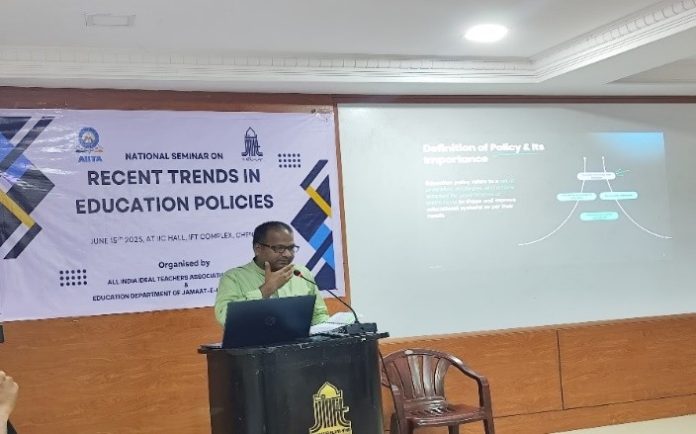– Md Farid
Education policy refers to a set of principles, strategies, and actions adopted by governments or institutions to shape and improve educational systems. These policies are directly interlinked with teacher training programmes and play an important role in the professional development of educators.
Two major policy initiatives in the Indian context – Right to Education Act (RTE) 2009 and National Education Policy (NEP) 2020 – highlight the changes in the educational reform in Indian context. As RTE completes 15 years in 2024 and NEP marks its 5th anniversary, their collective impact can be witnessed through various interventions across different states like Chhattisgarh, Madhya Pradesh, Rajasthan, and others.
However, despite the focus on inclusivity and accessibility, a critical area that continues to lacking and requires attention is the quality of teacher training programmes across the states. Without ensuring excellence in training programme, teachers’ pedagogical skills and content knowledge will remain unchanged and static.
Global Scenario on Education Policy
To further contextualise the Indian scenario, let us examine policy-level practices in countries like Finland, Sub-Saharan Africa, and Germany.
Finland’s education policy is globally recognised for its emphasis on rigorous teacher training:
- Teacher Training Schools: All levels of schooling are covered by specialised training schools where pre-service teachers practice under the supervision of master trainers.
- Collaboration and Research: These schools act as innovation centres, where teaching practices are continuously developed through collaboration among pre-service teachers, schools, and university staff.
- Academic Rigour: Each student is required to complete a Master’s thesis involving original research in education or their subject discipline. This will help to government to improve the quality of education across schools in the country.
Sub-Saharan Africa: Tackling Dropouts Through Policy
A major challenge in Sub-Saharan Africa is the high dropout rate among schoolchildren. Root causes include:
- Poor health and malnutrition
- Economic hardship and child labour
- Teacher absenteeism and poor-quality education
- Unfavourable school locations
Policy Reforms by Government as per the needs:
- Reducing Over-Age Enrolments: Addressing age-appropriate grade placement, especially in higher grades.
- Flexible Schooling Models: Adopting flexible hours and using mother tongue education as the medium of education in early grades.
- Support to Households: Providing micro-enterprise assistance to families to improve school retention rates.
Germany: Internationalising Higher Education
Germany is focusing on the internationalisation of higher education by encouraging university students to study abroad. As part of a government initiative, the goal is that by 2020:
- 50% of all degree students will have studied abroad as part of their academic programme (University of Oxford, 2015).
This move aims to develop global competencies and integrate international perspectives into the curriculum. Students can also exchange their cultures among both the countries. This will open the avenue for future job prospects also.
The Role of NGOs in Global Educational Reform
NGOs play an important l role in driving educational policy and reform across the globe. Work of two prominent organisations are as follows:
UNICEF: UNICEF emphasises that every child has the right to learn. As of recent estimates:
- 4 billion school-age children in low- and middle-income countries lack access to quality education.
- 420 million children will not learn the most basic skills during childhood.
- 825 million children may only acquire basic secondary-level skills.
UNICEF prioritises reaching the most disadvantaged and marginalised children, particularly in regions like Sub-Saharan Africa and India. And connect with them with mainstream of society through providing them quality education.
Room to Read (RtR): Room to Read is an international organisation dedicated to improving early literacy and girls’ education. Working across multiple countries, it supports governments in:
- Implementing policy-level interventions
- Enhancing foundational reading skills in early primary education
- Building community libraries and to trained the educators, as per the policy requirements.
While India has made considerable progress through RTE and NEP, lessons from such as Finland’s academic rigour, Sub-Saharan Africa’s community-focused reforms, and Germany’s international outlook offer valuable insights. Equally important is the partnership with organisations like UNICEF and Room to Read to bridge policy and practice.
The future of teacher training depends on investment in quality teachers training programme, innovation, and inclusivity – paving the way for developed nation and for empowering the younger generation also.
[The writer is Research Assistant, Markazi Taleemi Board, New Delhi]




